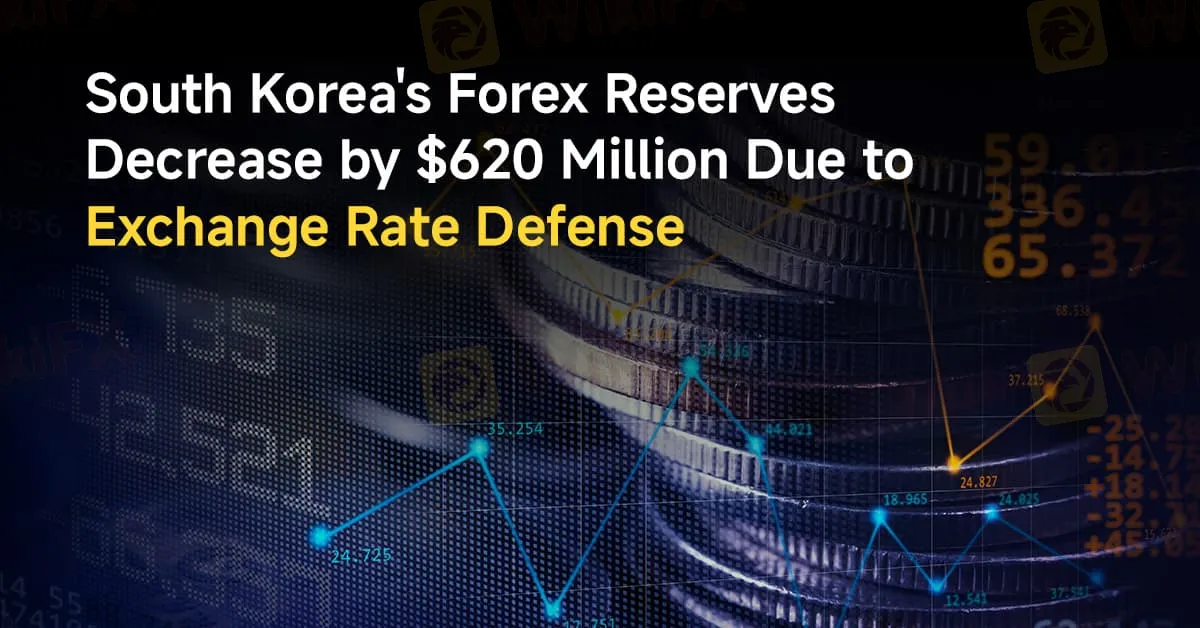简体中文
繁體中文
English
Pусский
日本語
ภาษาไทย
Tiếng Việt
Bahasa Indonesia
Español
हिन्दी
Filippiiniläinen
Français
Deutsch
Português
Türkçe
한국어
العربية
South Korea's Forex Reserves Decrease by $620 Million Due to Exchange Rate Defense
Abstract:As of the end of May, South Korea's foreign exchange reserves were ranked 9th globally, reflecting its robust position in international markets despite the recent adjustments.

As of the end of May, South Korea's foreign exchange reserves were ranked 9th globally, reflecting its robust position in international markets despite the recent adjustments.
South Korea's foreign exchange reserves experienced a decline of $620 million in June, influenced by various financial activities aimed at stabilizing currency exchange rates. According to the Bank of Korea's “End of June 2024 Foreign Exchange Reserves” report released on the 3rd of July, the country's reserves stood at $412.1 billion by the end of June, marking a decrease from the previous month.
The reduction in reserves can be attributed to several factors. Despite an increase in foreign currency deposits at financial institutions, primarily driven by the typical end-of-quarter effect, significant outflows were observed due to the repayment of foreign exchange stabilization bonds (FESBs) and foreign exchange swaps with the National Pension Service. Additionally, the appreciation of the U.S. dollar contributed to a decrease in the converted value of non-dollar foreign currency assets.
The Bank of Korea clarified, “The decrease in reserves was largely due to the maturity of FESBs and the settlement of foreign exchange swaps, coupled with the impact of a stronger U.S. dollar on the valuation of our foreign currency holdings.”
However, the central bank reassured that this decline is temporary, anticipating a reversal with the issuance of new FESBs scheduled for July. This issuance is expected to bolster reserves in the upcoming months.
The management of foreign exchange reserves plays a crucial role in South Korea's economic strategy, ensuring stability and resilience against global financial fluctuations.

Disclaimer:
The views in this article only represent the author's personal views, and do not constitute investment advice on this platform. This platform does not guarantee the accuracy, completeness and timeliness of the information in the article, and will not be liable for any loss caused by the use of or reliance on the information in the article.
Read more

The Hidden Checklist: Five Unconventional Steps to Vet Your Broker
Forex broker scams continue to evolve, employing new tactics to appear credible and mislead unsuspecting traders. Identifying these fraudulent schemes requires vigilance and strategies beyond the usual advice. Here are five effective methods to help traders assess the legitimacy of a forex broker and avoid potential pitfalls.

Doo Financial Obtains Licenses in BVI and Cayman Islands
Doo Financial, a subsidiary of Singapore-based Doo Group, has expanded its regulatory footprint by securing new offshore licenses from the British Virgin Islands Financial Services Commission (BVI FSC) and the Cayman Islands Monetary Authority (CIMA).

CFI’s New Initiative Aims to Promote Transparency in Trading
A new programme has been launched by CFI to address the growing need for transparency and awareness in online trading. Named “Trading Transparency+: Empowering Awareness and Clarity in Trading,” the initiative seeks to combat misinformation and equip individuals with resources to evaluate whether trading aligns with their financial goals and circumstances.

Malaysian-Thai Fraud Syndicate Dismantled, Millions in Losses Reported
The Royal Malaysia Police (PDRM) has received 26 reports concerning the Nicshare and CommonApps investment schemes, both linked to a major fraudulent syndicate led by a Malaysian citizen. The syndicate’s activities came to light following the arrest of its leader by Thai authorities on 16 December.
WikiFX Broker
Latest News
ASIC Sues Binance Australia Derivatives for Misclassifying Retail Clients
Top 10 Trading Indicators Every Forex Trader Should Know
WikiFX Review: Is FxPro Reliable?
Malaysian-Thai Fraud Syndicate Dismantled, Millions in Losses Reported
Trading frauds topped the list of scams in India- Report Reveals
AIMS Broker Review
The Hidden Checklist: Five Unconventional Steps to Vet Your Broker
YAMARKETS' Jingle Bells Christmas Offer!
WikiFX Review: Something You Need to Know About Markets4you
Revolut Leads UK Neobanks in the Digital Banking Revolution
Currency Calculator


